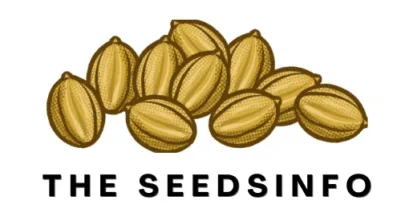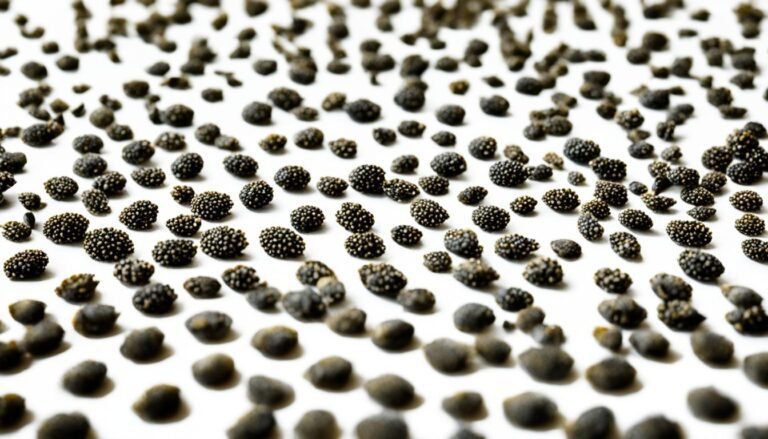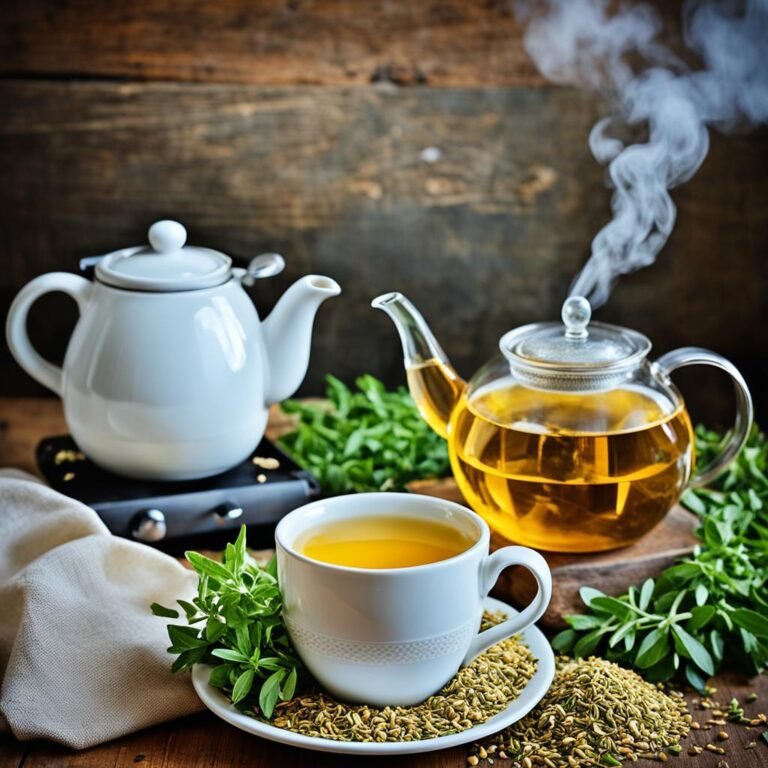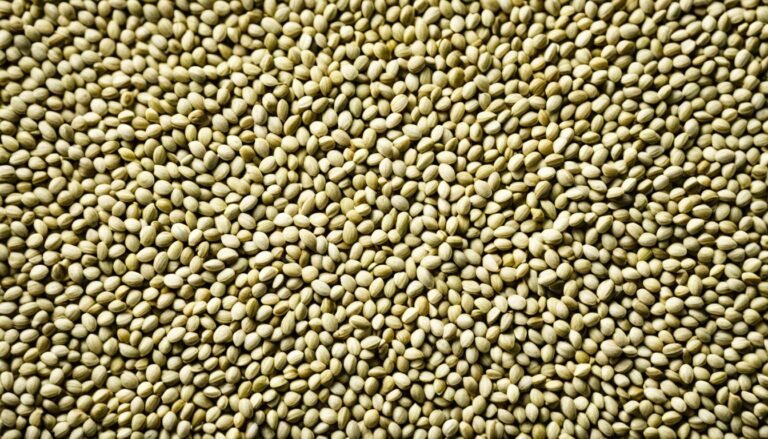Discover the health benefits of Poppy seeds
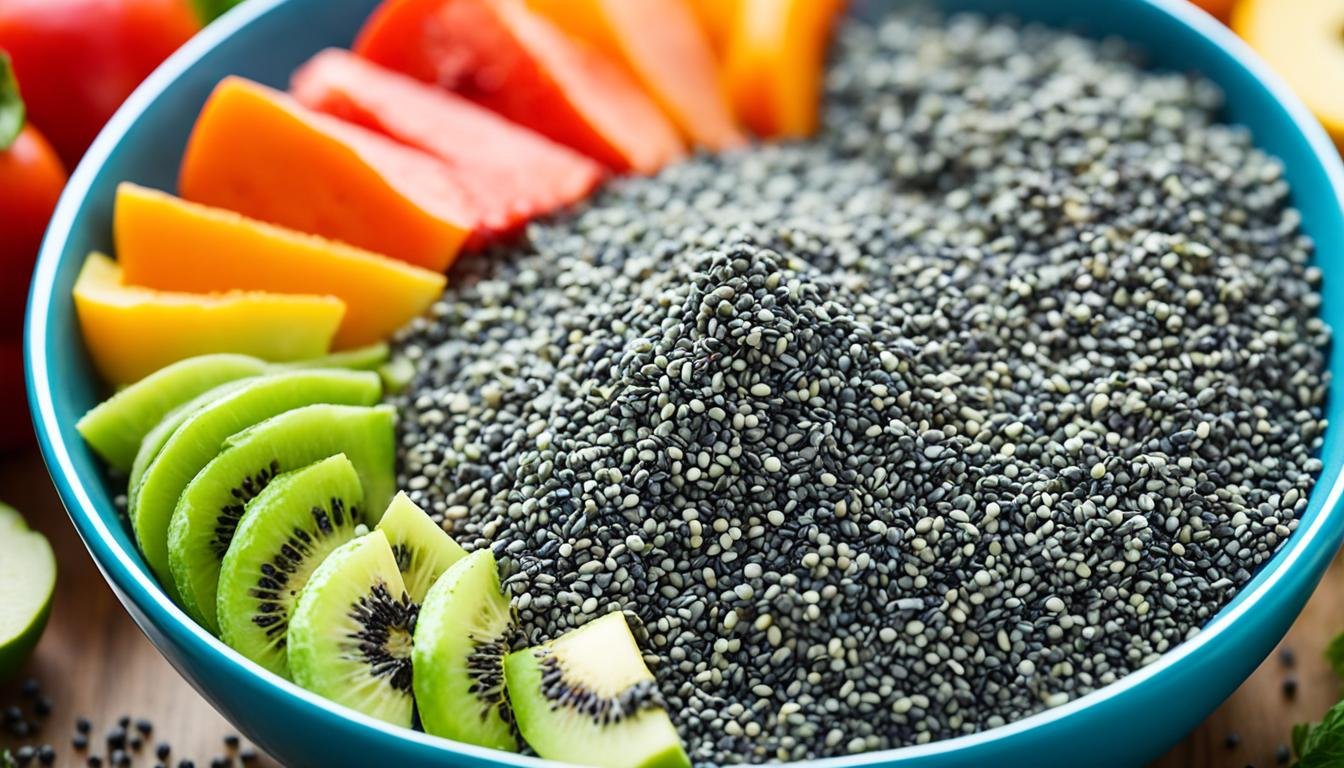
Did you know it takes over a million poppy seeds to weigh just one pound? Every year, 168 million pounds are produced in 15 countries. These tiny seeds are packed with nutrition. They have been used for thousands of years for both health and cooking.
Poppy seeds help with digestion and support brain health. They are a superfood you should try.
In the Mediterranean, people used poppy seeds as a mild sedative since 2700 BC. Now, they’re found in foods worldwide. Turkey, Czechia, and Spain lead in poppy seed production.
In the U.S., poppy seeds are loved for their unique taste. They’re often used on bread, pastries, and salad dressings.
What are Poppy Seeds?
Poppy seeds are small, rounded seeds from the opium poppy plant. They come in colors like white, oriental, and blue. Each type has its own flavor and uses in cooking.
Different Varieties of Poppy Seeds
The most popular types of poppy seeds include:
- White Poppy Seeds (also known as Indian or Asian Poppy Seeds): These small, pale-colored seeds have a mild, nutty flavor. They are commonly used in Indian and Middle Eastern cuisines.
- Oriental Poppy Seeds (also known as Opium Poppy): These bluish-gray seeds have a stronger, more pronounced flavor. They are often used in European baked goods and pastries.
- Blue Poppy Seeds (also known as European Poppy Seeds): These small, dark blue seeds have a slightly more robust taste. They are frequently used in Scandinavian and Eastern European dishes.
Nutritional Profile of Poppy Seeds
Poppy seeds are a nutritional powerhouse. They are packed with essential vitamins, minerals, and macronutrients. A 100-gram serving of poppy seeds contains:
| Nutrient | Amount |
|---|---|
| Protein | 18 grams |
| Carbohydrates | 28 grams |
| Dietary Fiber | 20 grams |
| Sugar | 3 grams |
Poppy seeds are also rich in essential fatty acids, calcium, magnesium, manganese, phosphorus, thiamin, folate, and zinc. They are a highly nutritious addition to any diet.

Whether you prefer the delicate flavor of white poppy seeds or the bolder taste of the blue variety, these versatile seeds offer a wealth of nutritional benefits and culinary possibilities.
Poppy Seeds: A Powerhouse of Nutrients
Poppy seeds are more than just a versatile ingredient in cooking and baking; they are a nutritionally dense superfood. These tiny seeds pack a powerful punch of essential vitamins, minerals, and beneficial compounds. They can have a profound impact on your health.
One of the standout features of poppy seeds is their impressive poppy seed nutritional value. They are rich in fiber, essential omega-6 fatty acids, calcium, magnesium, manganese, phosphorus, thiamin, folate, and zinc. In fact, just a tablespoon of poppy seeds contains nearly 10% of your daily recommended intake of these key nutrients.
| Nutrient | Amount per Tablespoon | % Daily Value |
|---|---|---|
| Calories | 55 | – |
| Total Fat | 5g | 8% |
| Carbohydrates | 3g | 1% |
| Fiber | 2g | 7% |
| Protein | 2g | 4% |
| Calcium | 52mg | 5% |
| Iron | 0.7mg | 4% |
| Magnesium | 32mg | 8% |
| Phosphorus | 52mg | 5% |
In addition to their impressive poppy seed nutrient profile, these seeds have been linked to a host of poppy seed health benefits. Some studies suggest that unwashed poppy seeds added to tea can help ease anxiety and promote better sleep. They are also a natural blood purifier and a potent source of antioxidants. These can help support overall health and wellness.
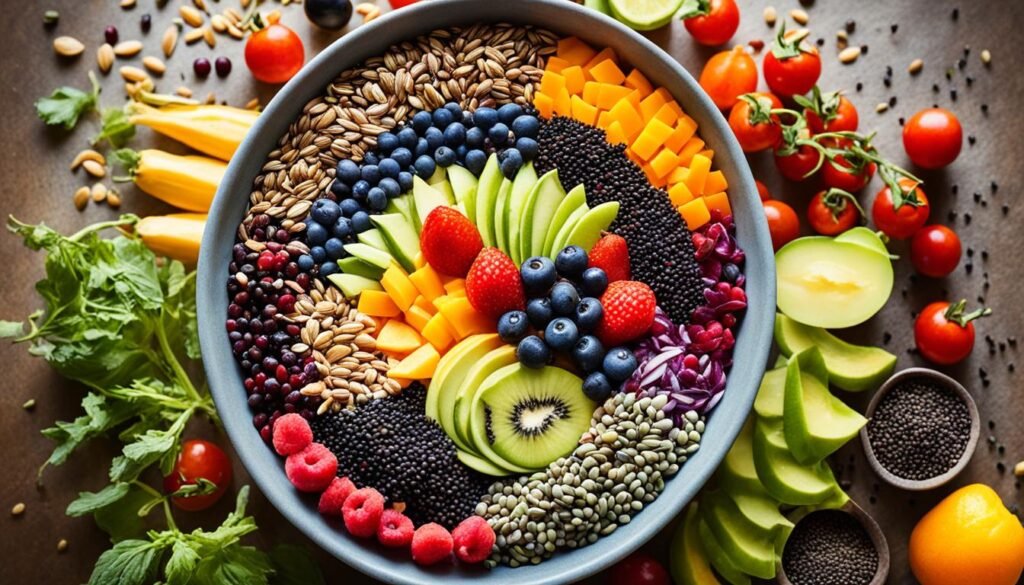
By incorporating poppy seeds into your diet, you can unlock a treasure trove of essential nutrients and potential health benefits. Whether you sprinkle them on your favorite dishes or incorporate them into your baking, these versatile little seeds are a true powerhouse of goodness.
Benefits of Poppy Seeds for Overall Health
Poppy seeds are a superfood full of nutrients. They help with digestion and support heart health. These small seeds are a big deal for your health.
Poppy Seeds and Digestive Health
Poppy seeds are great for your gut. They are full of insoluble fiber, which keeps your digestive system running smoothly. Just one tablespoon gives you about 7 grams of fiber, helping with constipation.
This fiber is key for a healthy gut. It feeds the good bacteria, improving nutrient absorption and boosting your immune system.
Poppy Seeds and Cardiovascular Health
Poppy seeds are good for your heart. They have omega-3 fatty acids that can lower cholesterol and reduce heart disease risk. The antioxidants in them protect your heart and blood vessels from harm.
The fiber in poppy seeds also helps your heart. It lowers LDL (bad) cholesterol and prevents artery plaque, supporting heart health.
| Nutrient | Amount per Tablespoon | Percentage of Daily Value |
|---|---|---|
| Calories | 46 | – |
| Protein | 6g | – |
| Fat | 7g | – |
| Carbohydrates | 5g | – |
| Fiber | 7g | 25% |
| Manganese | 0.6mg | 26% |
| Copper | 0.3mg | 16% |
| Calcium | 100mg | 10% |
Poppy seeds are packed with vitamins, minerals, and compounds that boost your health. Adding them to your meals can bring many benefits.
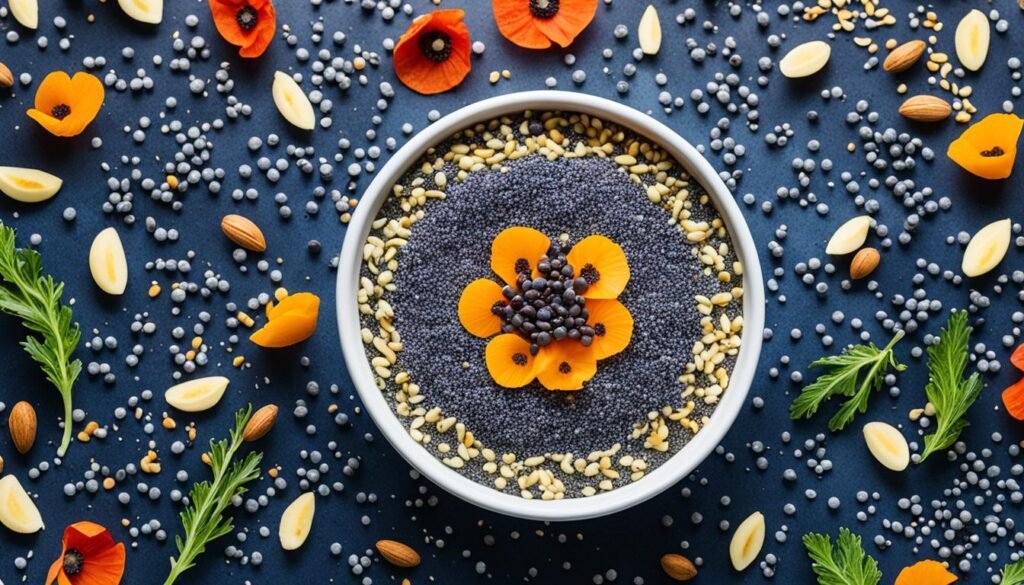
Health benefits of poppy seeds
Poppy seeds are more than just tasty in baked goods and savory dishes. They are packed with health benefits. These small seeds help with bone health and brain function.
Poppy Seeds for Bone Health
Poppy seeds are full of minerals like calcium and manganese. These minerals are key for strong bones. Calcium builds bones, and manganese helps make collagen, which protects bones.
A 100-gram serving of poppy seeds has 1,250 milligrams of calcium, more than the daily need. They also offer 357 milligrams of manganese per 100 grams. This makes them great for bone health.
Poppy Seeds and Brain Function
Poppy seeds do more than help your bones. They also support brain health and thinking skills. These seeds have a lot of iron, which cleans the blood and boosts hemoglobin. This improves blood flow and oxygen to the brain, making thinking clearer and sharper.
They also have potassium, which helps prevent kidney stones and keeps them from coming back. This is good for your brain health too.
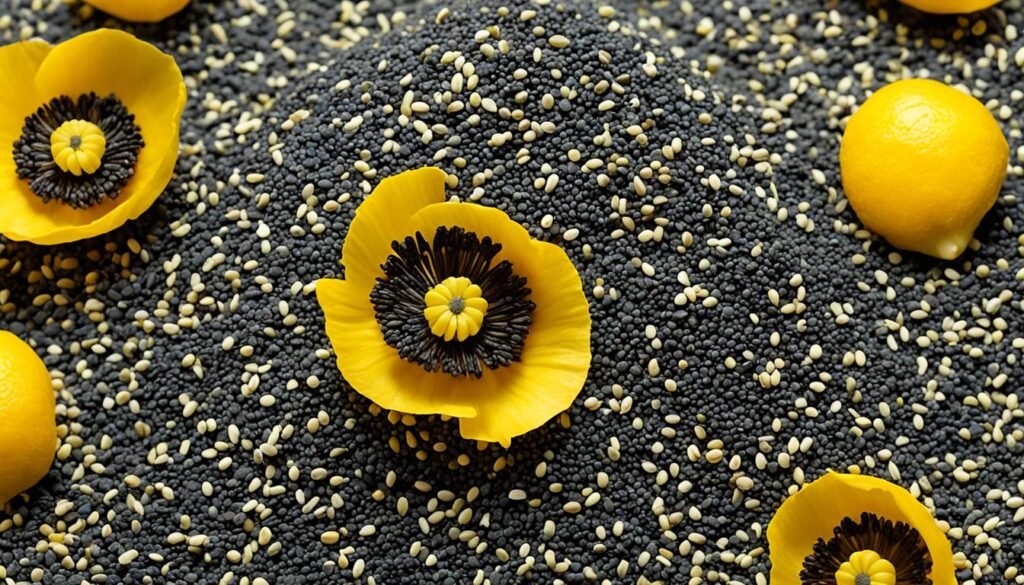
“Incorporating poppy seeds into your diet can provide a wealth of health benefits, from strengthening your bones to supporting your brain function.”
Adding poppy seeds to your meals is a tasty way to boost your bone density and brain function. It’s a simple step towards better health.
Poppy Seeds: A Natural Pain Reliever
For generations, poppy seeds have been a trusted option to alleviate pain. Many ancient medical practitioners used them to comfort their patients. They found that poppy tea, made by infusing the seeds in hot water, was effective in reducing pain.
The pain-relieving power of poppy seeds comes from their opium content. Dry poppy seeds have small amounts of opium alkaloids like morphine and codeine. These compounds help soothe nervous irritability and act as natural painkillers.
The Opium type of poppy seeds has the highest levels of pain relief. In fact, poppy seeds pain relief can be quite significant in this variety. They contain up to 98% of the total alkaloid content as thebaine, a potent analgesic compound.
“Poppy seeds have been used for centuries as a natural remedy to alleviate pain and discomfort. The analgesic properties of these seeds can be traced back to the opium alkaloids they contain, which have a soothing effect on the body.”
While the poppy seeds analgesic properties can be beneficial, it’s crucial to be cautious. Taking too much or using contaminated seeds can lead to opioid dependence and health risks. Always talk to a healthcare professional before using poppy seeds for pain relief.
In conclusion, poppy seeds for pain management have a long history. They can offer natural relief for various discomforts. But, it’s important to use them responsibly and with medical guidance for safe and effective results.
| Alkaloid | Percentage in Poppy Seeds |
|---|---|
| Morphine | 20% |
| Noscapine | 5% |
| Codeine | 2% |
| Papaverine | 2% |
| Thebaine | 1% |
Other Potential Benefits of Poppy Seeds
Poppy Seeds for Hair Health
Poppy seeds are great for your body and hair too. They are full of vitamins, minerals, and antioxidants. These nutrients can make your scalp healthy and help your hair grow.
Poppy seeds can help fight dandruff. Make a hair mask with soaked poppy seeds, white pepper, and hung curd. Put it on your scalp for 30 minutes, then rinse. Doing this regularly can reduce dandruff and soothe irritation.
The antioxidants in poppy seeds also fight inflammation and infections on the scalp. This leads to healthier hair and a balanced scalp. Adding poppy seeds to your hair care can make your hair shiny and free of dandruff.
Poppy Seeds and Stress Relief
Poppy seeds are not just for cooking; they help with stress and sleep. The opium poppy, where poppy seeds come from, makes you feel relaxed and sleepy.
Eating poppy seeds, in tea or warm milk, can ease stress and anxiety. They have magnesium which lowers stress hormone cortisol. Poppy seeds are a natural way to relax and sleep better.
Adding poppy seeds to your routine can be easy and effective. Mix them with herbs like lavender, chamomile, and lemon balm for more benefits. These seeds can help you manage stress and support your well-being.
Incorporating Poppy Seeds into Your Diet
Poppy seeds are a versatile ingredient for both sweet and savory dishes. They can add a unique flavor to your baked goods or make your meals more nutritious. Let’s look at some tasty ways to enjoy poppy seeds.
Poppy Seed Recipes
Poppy seeds are common in European and Middle Eastern cooking. They add a nutty, slightly sweet taste to dishes. Here are some popular ways to use them:
- Sprinkle poppy seeds on your morning yogurt or oatmeal for a nutritious boost.
- Add poppy seeds to quick bread, muffins, or scones for a delightful texture.
- Mix them into salad dressings or vinaigrettes for a tangy flavor.
- Use ground poppy seeds to thicken and flavor sauces and stews, common in Indian and Middle Eastern dishes.
- Top bagels, toast, or crackers with poppy seeds for a simple garnish.
- Add poppy seeds to pasta dishes, like lemon-poppy seed sauce or roasted vegetables.
- Bake pastries filled with poppy seeds, such as Hamantaschen cookies or poppy seed rolls.
There are many ways to use poppy seed recipes, ways to use poppy seeds, and poppy seed dishes in your cooking. Try these versatile seeds to add a unique flavor and texture to your meals.
“Poppy seeds are a wonderful way to add a delicate crunch and nutty flavor to both sweet and savory dishes. From baked goods to salads and beyond, these tiny seeds are a true culinary gem.”
Precautions and Side Effects
Poppy seeds are great for health, but know the risks and side effects first. Make sure to buy them from reliable sources. This is because they can have opioid compounds if not handled right. Eating too many poppy seeds can make you feel the opioid effects, which is not good.
Be careful if you’re using poppy seeds to help you sleep. You might become dependent on them. It’s best to eat them in small amounts. This way, you avoid a false positive on a drug test. Poppy seeds are full of minerals like calcium and iron, and they fight off stress and inflammation in your body.
Eating a lot of poppy seeds might lead to a false positive on a drug test because of the opiates they contain. But, they are safe for people with nut allergies since they’re seeds, not nuts. Still, talk to a doctor before eating poppy seeds if you have health issues or take other medicines.
| Potential Side Effects of Poppy Seeds | Precautions to Consider |
|---|---|
| Drowsiness or difficulty in breathing due to potential alkaloid contamination during poor harvesting practices | Source poppy seeds from trusted retailers to ensure proper processing and handling |
| Increased risk of developing dependency when used for insomnia treatment | Monitor the use of poppy seeds for insomnia and consult a healthcare professional |
| Positive drug test results for opioids due to overconsumption | Consume poppy seeds in moderation and be aware of the potential for drug test implications |
| Interactions with sedative medications, such as benzodiazepines and central nervous system (CNS) depressants | Consult a healthcare professional before using poppy seeds if you are taking any medications |
Keep these precautions and side effects in mind to safely enjoy poppy seeds. They offer many health benefits.
Conclusion
Poppy seeds are a versatile ingredient that brings many health benefits. They are packed with fiber, essential nutrients, and compounds that help your digestive health, heart, bones, and brain. They can also help with pain and stress. But, remember to eat them in moderation because of their opioid content.
Poppy seeds add a unique flavor and texture to both sweet and savory dishes. They are a great way to boost your health and make your meals more interesting. Adding poppy seeds to your diet can support your physical and mental health.
Poppy seeds are important for their nutritional value and health benefits. Adding them to your meals can lead to a healthier life. So, start exploring how to enjoy poppy seeds and their benefits today.
FAQ
What are the health benefits of poppy seeds?
Poppy seeds are packed with nutrients like fiber and omega-6 fatty acids. They also have calcium, magnesium, and other minerals. These nutrients help with digestion, heart health, bone strength, and brain function.
What are the different varieties of poppy seeds?
There are several types of poppy seeds. White Poppy seeds are also known as Indian/Asian Poppy seeds. Oriental Poppy seeds are another type, also called Opium Poppy. Then there are Blue Poppy seeds, known as European Poppy seeds.
What is the nutritional profile of poppy seeds?
Poppy seeds are full of fiber, protein, and minerals like calcium and iron. They also have omega-6 and omega-9 fatty acids. These nutrients are good for your health.
How do poppy seeds benefit digestion and cardiovascular health?
Poppy seeds are high in insoluble fiber, which helps your digestive system and prevents constipation. They also have omega-3 fatty acids. These can lower the risk of heart disease.
What are the benefits of poppy seeds for bone and brain health?
Poppy seeds are rich in copper, calcium, and manganese for strong bones. They also have iron, which boosts blood circulation and brain function.
How can poppy seeds be used as a natural pain reliever?
For generations, poppy seeds have been used to ease pain. The Opium variant has opioid alkaloids that help with pain relief.
What are the potential benefits of poppy seeds for hair and stress relief?
Poppy seeds are full of antioxidants and nutrients that support hair and scalp health. They also have magnesium, which lowers stress hormones and helps with sleep.
How can poppy seeds be incorporated into the diet?
Poppy seeds can be used whole, ground, or turned into oil. They’re great in baking and also in dishes like salad dressings and pasta.
Are there any precautions or side effects to be aware of when consuming poppy seeds?
Make sure to buy poppy seeds from trusted sources, as they can have opioid compounds. Eating too much can lead to a positive drug test. Always eat them in moderation.
